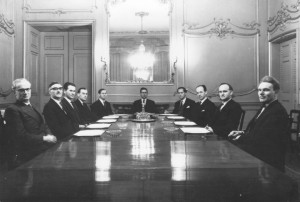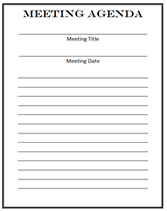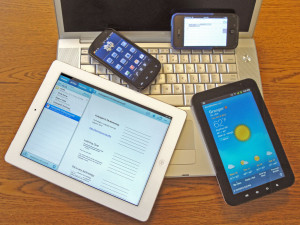Board Room, Bored Room and the Existential Horror of Styrofoam Coffee Cups: 13 Ways to Avoid Waiving Privilege in Corporate Meetings
Reading Time: 5 minutes.

This discussion by Mark Herrmann at Above The Law — Law Firm Meetings Vs. Corporate Meetings, Meetings, Meeting, And Meetings! — is a wonderful set-piece about meetings. Read the whole article, but here he compares law-firm meetings corporate meetings:
Corporations are different. They’re publicly traded. They’re often much larger than law firms. They’re divided into operational divisions with pyramidal structures, with many people reporting to fewer people who report to fewer people still who report to someone near the top. Put that all together, and it means meetings. And meetings. And meetings. And meetings. In fact, to my eye, there are four types of corporate meetings . . . .
First, there are meetings that are necessary to move the ball. These are the types of meetings that you experience at law firms: Several people are undertaking different tasks. The tasks must be coordinated, and you need a unifying mind at the top to know what’s happening. So you meet.
Or you’re struggling with a tough issue that you can’t resolve alone. You need help, so you meet.
Thus, the first type of meeting is one that’s substantively necessary: You meet to move the ball.
But we set meetings at corporations for many other reasons, too.
Because of the frequency of internal corporate meetings, and the manner in which they are conducted, they are prime pathways to waive the company’s privilege. How can we minimize the likelihood of doing so?
The modernist American poet Wallace Stevens (1879-1955) wrote Thirteen Ways of Looking at a Blackbird. You are an internal corporate lawyer. Think of this article as “Thirteen Ways Of Looking At An Outlook Invitation.”

1. Judges and juries think you’re a gangster. Realize that judges and juries, the ultimate consumers of lost privilege, think that internal counsel are some kind of consigliere — at best. You are perceived (wrongly, usually) as a businessperson worried about budgets or looking good for the boss or covering up problems, rather than as lawyer with independent judgment, ethical constraints and multiple clients rather. This is why, for example, agents and prosecutors do not especially like you, either, and may ask that you not attend employee interviews. The privilege caselaw about internal lawyers is often not great, either.
2. Pretend that you are Tom Hagen. In the movies The Godfather and The Godfather Part II, the consigliere to Don Vito Corleone (Marlon Brando), and later Don Michael Corleone (Al Pacino), is Tom Hagen (Robert Duvall).

Fantasize that you actually are a consigliere, which has the two-fold benefit of (a) driving other people crazy and (b) preserving privilege. Follow steps (3) to (13) below.
3. Face-to-face. Among mob movies, The Godfather franchise still reigns supreme. In The Godfather, does anybody talk on the phone? Not if they can help it: somebody’s always listening. You should assume the same.
Face-to-face, outside, with a cement mixer in the background is best for avoiding audio surveillance.

“Thanks, Tom. Thanks.” ―Frank Pentangeli and Tom Hagen
You’ve seen it in the movies. Face-to-face is best for preserving privilege, too: no forwarded emails or unintended texts to worry about. (f you want to unnerve others in the meeting, you can pay your drug-addled nephew, the one at the construction company, fifty dollars to drive a cement mixer back and forth outside).

4. Phone over email. If it’s raining outside, or if cement mixers are too grimy, use the phone rather than email or text.
5. Maximize formality to maximize privilege. Here in the 21st century, business is supposedly informal, collaborative and horizontal rather than hierarchical. (Supposedly. Mainly, in many informal, collaborative and horizontal offices I see guys who would barely look good in suit-and-tie wearing clothes designed for junior-high volleyball coaches). Privilege, on the other hand, is formal: privilege law draws sharp distinctions based upon need-to-know; control groups versus the controlled; and circles within circles. If an activity actually helps the business, the product or the service, or is useful to and used by lots of people across the organization, it’s probably not privileged.
6. If it was good enough for the Dead Sea scrolls, it’s good enough for you. If there are to be agendas at the meeting, print them out on paper and then, after the meeting, collect them back up.

7. Put a bullet in bullet-lists. A PowerPoint presentation is already sufficiently soul-eating. (See Edward Tufte’s work on this subject). Do not compound the problem by allowing meeting attendees to tote the presentation around: do not print out the PowerPoint slides and do not distribute them.
8. They no longer make carbon paper. Ban “cc’s,” an abbreviation for “carbon copy.” (Remember mimeograph machines, though? Nothing made you think “second grade” more than the smell of mimeograph fluid). Some employees seem to think that the more they “cc,” the more they communicate (or the more CYA they have). In general, the longer the “cc” list, the more likely that privilege will be lost, if indeed the email was privileged in the first place.
9. “Re” is a Latin prefix, not a meaningful communication. Do not re-use the same subject line in emails. Despite advances in technology, recycled “re” lines make pulling out the privileged thread more difficult and encourage thoughtless, too-rapid correspondence.

10. Crimson Security. If you must distribute documents with important factual and legal findings, print them on red paper. When scanned or photocopied, red paper turns black. You do not waive anything because no one can read anything.
11. Technological omerta. Look into “Silent Circle” or similar tools to minimize the permanence of emails.
12. Upjohn Massacres. Speak the language of Upjohn, frequently, meetings. It sobers people up. Seriously: people need to remember that the substance of the meeting is privileged and that the privilege is held by the company.
13. BYOD Is More Of A Menace to Privilege Than BYOB. Bug your IT people about making and enforcing a coherent policy on the phenomenon of “bring your own device” to work. (BYOD is not going away. Most employees would much rather bring their own device to work than bring their own children to work).

Good luck.